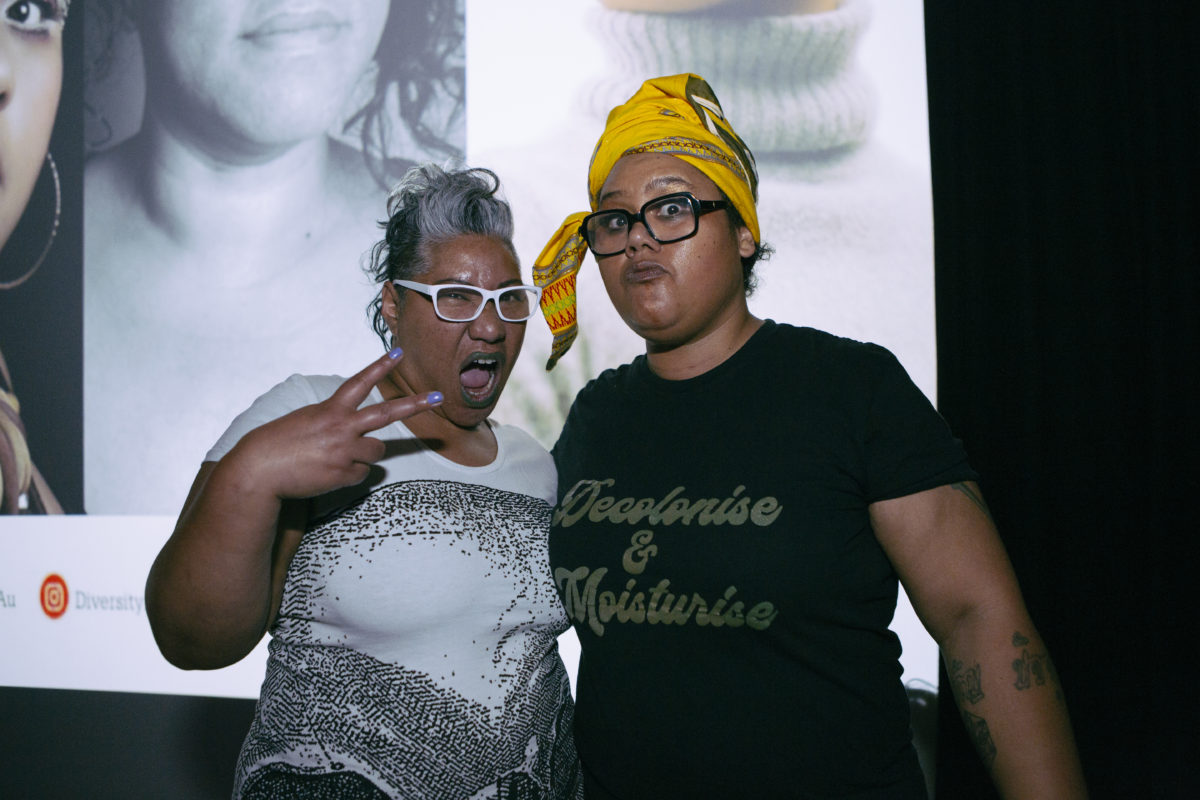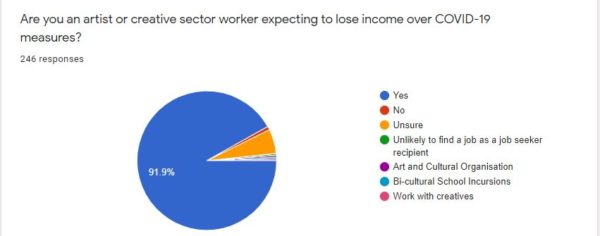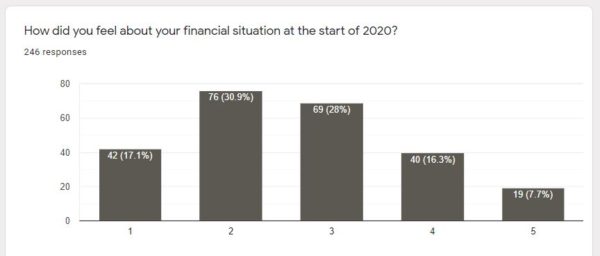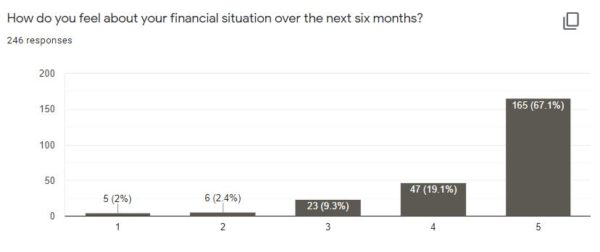
Lost Work for Creatives of Colour: Results from Our Survey
Cancelled gigs, lost teaching jobs, postponed tours. The story is grim for Australia’s creative sector. And for culturally and linguistically diverse (CaLD) artists, who were already among the most disadvantaged artists in Australia, it’s even worse.
A survey of artists and creatives of colour conducted by Diversity Arts Australia shows (as of 20 May 2020) 91.9% of respondents were expecting to lose income over COVID-19 measures. The survey will remain open and results will be continually updated. See our media release for the early findings.

The survey focused on culturally and linguistically diverse (CaLD) creatives, and also collects data from creatives identifying as First Nations, LGBTIQ+, and People with Disability. It also includes creatives from refugee backgrounds and other migrants who may not qualify for stimulus benefits.
The survey was launched on 18 March. Results to 20 May 2020 show:
- 246 people have responded
- 92% of surveyed respondents expect to lose income.
- The estimated amount of income lost is over $2.3 million.
- Respondents have reported negative effects on their interconnected communities and their mental health, including some increased experiences of COVID-19 related racism.
Of our respondents 85.3% identified as being culturally and linguistically diverse, and 10% as being First Nations, while 20.4% identified as LGBTIQ+ and 8.9% as a person with disability. Speakers of over 46 community languages responded.
Respondents tell a depressingly similar story of a professional life decimated in a matter of days. Find additional stories at our survey quotes page.
‘In one week I lost almost $3000 in cancellations, I have no work booked in the future and no income for the foreseeable future.’
‘All my performances have been cancelled and other studio work as well. I’m struggling already to pay rent for my music studio and also home.’
‘The cancellations started right before Harmony Week which is a massive week for culturally diverse artists who work in schools. We had 3 gigs cancelled in that week.’
Confidence about the future financial situation
There’s also been a steep decline in artists’ confidence about their financial future, with respondents who felt weak or very weak about their financial situation rising from 24% to 86.2%.


‘I was looking forward to this amazing opportunity to work with some industry legends at one of the big theatre companies in Melbourne and now all theatres have closed their doors so actors who work in the theatre now have no work. Even if you multi-skill in the arts, it doesn’t make a difference because the whole sector has been put on hold.’
‘At the start of the year, I was so excited and optimistic as I had an entire year of work lined up. I was signed up for school performances and running weekend workshops but these have all been either postponed or cancelled. My future is now pretty bleak. As a performer from a diverse background finding work is always a challenge, now more so than ever before.’
‘As the year began, I had several exhibitions planned and was embarking upon a new program of study. I’d work and saved myself to this point – rearranging my life and income to make these things possible. Fast forward a few weeks: my university is all but closed, and my exhibitions are postponed indefinitely. I have no studio in which to work, and no platform through which to sell my work if I could make it. Having budgeted towards a year of low-income, my finances are unchanged. What’s shifted is the horizon. I know I will be fine, because as artists we learn to shed so many material aspirations, to make do, and to stay the course.’
Lost income
Artists are a creative lot, and typically make a living in a variety of entrepreneurial ways. But the impacts of the COVID-19 measures are seeing them taking a hit on many fronts.
Most respondents (63.9%) were losing work in a creative project, but 46.7% were losing work from a public event such as a talk, seminar or appearance; 25.8% were losing work in project administration and management, and 32.8% were losing work in education and training.
‘I have a number of school, preschool, library and theatre shows booked in for the next few months, slowly but surely these have all messaged me with cancellations and no rebooking.’
‘I am a bharatanatyam dance teacher and performer based in Melbourne. After the Covid outbreak, I had to cancel my classes which was my primary income. I also had a dance concert planned in May. I had to push the plan to next year, this would also leave behind a deficit of income. Few multicultural and community organisations have also cancelled my performances that added the problem.’
‘I have a weekly performing arts workshop that’s been suspended and a run of performances as part of a theatre ensemble that is on hold. I also had an interstate performance in June and another local one in March that were cancelled. With no solid timeframe, it’s going to get harder to maintain good mental health amongst my peers and stay financially afloat.’
Supporter organisations doing it tough
Many organisations who provide the scanty support that is on offer for creatives of colour also reported closing their projects down.
‘As the only comedy show in Sydney that privileges the voices of comedians of colour and collaborates with local business venues to increase their chances of survival, even a temporary shutdown of local shows destroys the potential for our performers, contractors and venues to earn much-needed income.’
‘The story of the people’s journey as asylum seekers was to commence, the women would have been paid a stipend, they would also have social connection and advocacy opportunity. Thanks to the work of an unpaid staff member we are working on changing to a virtual platform, this is challenging as there may be a higher cost and a launch to enable participants pride will be limited therefore stipend payments lessened. We cannot provide childcare for any aspect of the work and therefore many women may not be able to participate with children at home. For most of these women there is no family in Australia to assist with childcare.’
‘I organise a pool of artists that regularly visits schools for intercultural and interactive presentations: craft, music, dance, cooking and cultural ancestral sport experiences. With the uncertainty of the current situation, we lost some of the engagements and have lost some of the diversity week school visits.’
‘My concern is that my business of eight years will be unable to sustain the support I provide to the SME sector and individuals, through advice, professional development, strategy and innovation. I fear we will lose the innovation in the sector the most – and the growing commitment to diversity and inclusion.’
Rise in racism
The COVID-19 crisis has brought to light worrying examples of racism across the country, including an 80% drop in business in Sydney’s Chinatown, parents refusing to allow Asian doctors to treat their children at Royal Children’s Hospital Melbourne, and a racist fake media release pretending to be from the Queensland Department of Health.
Diversity Arts has heard many anecdotal cases of racism in the community and is currently gathering stories to aid our advocacy. Contribute your stories to the Diversity Arts – Lost Work Survey and the COVID-19 Coronavirus Racism Incident Report Survey: This reporting mechanism is a project by Erin Chew, Being Asian Australian, the Asian Australian Alliance in collaboration with Osmond Chiu and in partnership with Diversity Arts Australia and Democracy in Colour.
Around the world, activists and artists are organising against this #coronaracism, ranging from calls for US Congress to denounce anti-racism around coronavirus, in an atmosphere where Asian Americans are being assaulted and subjected to racist rants in public, to the #JeNeSuisPasUnVirus hashtag launched by the French Asian community to respond to racially motivated attacks. It has inspired other languages to follow suit: #IamNotaVirus and #NoSoyUnVirus. These are joined by homegrown hashtags such as #iwilleatwithyou and #DontDumpTheDumplings to support Chinese businesses.
The arts and creative sectors can play a huge role in combating the stereotypes we know can fan the flames of racism and unconscious bias. Efforts such as Melbourne street artists @van_nishing ‘I am not a virus’ mural in Melbourne on Brock Way in Flemington, as well as Instagram artist campaigns are crucial to pushing back against racism in our community.
What does this mean?
Artists and creatives of colour are among the most vulnerable members of an industry – the arts – that’s been one of the worst hit by COVID-19 measures.
We know from Diversity Arts Australia’s 2019 Shifting the Balance report that less than 10% of Australian arts, screen and creative sector leaders are from a culturally and linguistically diverse (CaLD) background, despite CaLD people making up 39% of the general population.
We know from the Australia Council for the Arts’ 2017 Making Art Work report that twice as many artists from non-English Speaking Backgrounds find the lack of financial support as the biggest limit to their work compared to other artists, and that these artists were less likely to be successful in funding applications.
Artists of colour have a harder time gaining employment in the arts at the best of times. This crisis poses the risk of entrenching this disadvantage as work in the arts becomes ever more scarce. Just as worrying, a rise in racist incidents in the community is having a huge impact on artists’ mental, physical and financial wellbeing.
What can we do?
Diversity Arts Australia is making an urgent call to governments to ensure adequate support packages reach the most under-represented sections of the creative sector. Any measures to support the arts, and indeed all sectors of the Australian economy, must include equity provisions to ensure that our most vulnerable community members are not left out.
Fight racism and racist stereotypes Speak out against racism wherever you see it, including calling out racist assumptions, racial profiling and stereotyping. Report racism to your State/ Territory body and federal bodies such as the Australian Human Rights Commission and the Racism. It Stops With Me campaign.
Ensure Adequate Support Packages Governments need to ensure adequate support packages reach all sections of the arts. We support measures such as Live Performance Australia’s $850 million package. Similar measures will need to be implemented across all creative sectors, including screen, visual arts and writing.
Equity Test Support to Reach the Most Vulnerable All support packages must be equity tested to ensure they support the most vulnerable people in an already precarious industry. We need to ensure our creative industries do not become more inequitable and unrepresentative than they already are as a consequence of this crisis.
Support the Supporters Support the organisations that advocate for marginalised and underrepresented creative workers. Dedicated funding streams to be distributed through relevant peak bodies and organisations who are connected with the affected creative workers (e.g. Diversity Arts, Multicultural Arts Victoria, CANWA, regional arts orgs, Aboriginal arts organisations and disability arts organisations)
Become a Micro-Patron Commission a work from an artist, a new song or recording from a musician. Set up an online lesson in your favourite art form. Donate to an organisation or directly to an independent practitioner. Make contributions for online performances. Buy music, books and artworks from diverse artists. Connect with diverse creatives via Multicultural Arts Victoria, Community Arts Network WA, Brisbane Entertainment Multicultural Arts Centre, Arts Nexus.
Employ Creatives (to Help Manage Shutdowns)
To read more about the survey results visit our first media release and stories from What Artists and Creatives told us. Need additional arts support? Visit our COVID-19 resources page.
Lost Work Survey for Artists and Creatives of Colour
If you haven’t already participated in our lost work survey for Artists and Creatives of Colour, help us advocate for assistance, check it out below.
